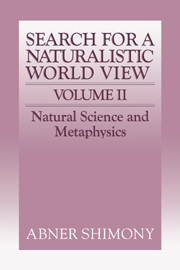Book contents
- Frontmatter
- Contents
- A MEASUREMENT IN QUANTUM MECHANICS
- B QUANTUM ENTANGLEMENT AND NONLOCALITY
- 7 Experimental test of local hidden-variable theories
- 8 An exposition of Bell's theorem
- 9 Contextual hidden variables theories and Bell's Inequalities
- 10 Controllable and uncontrollable non-locality
- 11 Events and processes in the quantum world
- 12 An exchange on local beables
- 13 Physical and philosophical issues in the Bohr–Einstein debate
- C COMPLEX SYSTEMS
- D TIME
- E THE MENTAL AND THE PHYSICAL
- Index
7 - Experimental test of local hidden-variable theories
Published online by Cambridge University Press: 05 June 2012
- Frontmatter
- Contents
- A MEASUREMENT IN QUANTUM MECHANICS
- B QUANTUM ENTANGLEMENT AND NONLOCALITY
- 7 Experimental test of local hidden-variable theories
- 8 An exposition of Bell's theorem
- 9 Contextual hidden variables theories and Bell's Inequalities
- 10 Controllable and uncontrollable non-locality
- 11 Events and processes in the quantum world
- 12 An exchange on local beables
- 13 Physical and philosophical issues in the Bohr–Einstein debate
- C COMPLEX SYSTEMS
- D TIME
- E THE MENTAL AND THE PHYSICAL
- Index
Summary
The study of hidden-variable interpretations of quantum mechanics was transformed by two papers of Bell. In his 1966 paper in Reviews of Modern Physics [1] he analysed the argument of von Neumann [2] and the more powerful arguments of Jauch and Piron [3] and of Gleason [4], all leading to similar conclusions about the nonassignability of simultaneous values to all the observables of a nontrivial quantum system; and he showed that these arguments do not exclude what may be called “contextualistic” hidden-variable theories, in which the value of an observable O is allowed to depend not only upon the hidden state λ, but also upon the set C of compatible observables measured along with O. In Bell's 1964 paper in Physics [5] (written later than the other, in spite of the earlier publication date) he gave a new kind of argument against a hidden-variable interpretation of quantum mechanics, by showing that no hidden-variables theory which satisfies a certain condition of locality can agree with all the statistical predictions of quantum mechanics.
The main purpose of this lecture is to discuss an experiment, designed by Clauser, Horne, Holt and myself [6], which is based on Bell's proof of the incompatibility of quantum mechanics and local hidden-variable theories. Before doing this, however, I wish to make several comments.
- Type
- Chapter
- Information
- The Search for a Naturalistic World View , pp. 77 - 89Publisher: Cambridge University PressPrint publication year: 1993



